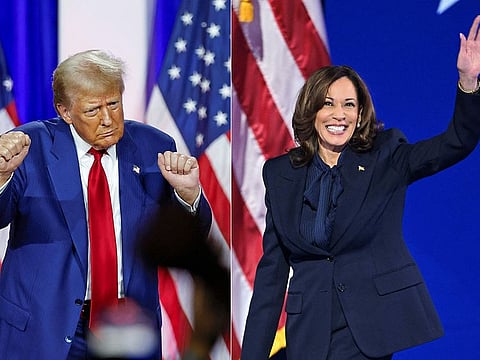Trump vs. Harris: A campaign of chaos, missed issues
America would have to demonstrate that it is serious about its leadership role

If there ever was a recorded history of US Presidential election campaigns characterised by a plethora of rumours, personal attacks, pettiness and half-truths, then the current contest between former President Donald Trump and Vice President Kamala Harris could possibly qualify for such a place in that not-so-endearing record book.
What should have been a mutually respectful way of carrying out a contest, threatens to derail into an unsavoury chapter in Presidential election campaigning. As a result, major issues requiring urgent attention are hardly discussed objectively, and get obfuscated by personal attacks and petty squabbling.
Issues weighing heavily on the average Joe such as inflation, rising unemployment, illegal migration, rise in violent crimes, etc often get sidetracked in the verbal melee. Fact checks about the veracity of many statements, have yielded many factual inaccuracies.
While attacking the surge in illegal migrants entering the United States — the Trump camp alleged there were 13 million illegal migrants in the country — under the Biden-Harris administration, Trump maintained that such migrants were involved in violent crimes, thefts, etc, creating serious law and order issues. He alleged that Haitian migrants in Springfield, Ohio, for instance, were stealing dogs and cats and eating their meat.
Wild claims
However, Springfield city administration stated on its website that there were, at most, some 15,000 immigrants living in Clark County, and Haitian immigrants were legally admitted under a parole programme; the local authorities also did not find any evidence of pets being stolen and eaten by Haitians.
Trump’s uncorroborated narrative about Haitian migrants stealing pets and eating them triggered bomb threats, leading to school closures. Springfield mayor Rob Rue asked the Presidential candidates to be mindful of “what their words are doing to cities like ours”.
Indeed, even Pope Francis at the Vatican criticised Trump for his immigration stand but the former also rebuked Harris for her open support to women’s abortion rights, describing abortion as an “assassination” of the unborn child from the womb of the mother.
Nevertheless, violence has surged in many major cities across the US. New York, for example, has seen a surge in violent attacks against old and helpless people, against stores and other high-end outlets; while illegal migrants had indeed engaged in crimes such as gun violence and armed robbery, many of the crimes were also committed by local perpetrators.
Some New York businesses, unable to face further losses incurring from mass thefts and armed attacks, have threatened to move out of the city. Trump blamed Harris, calling her the “border Tsar” and highlighting her failure, as Vice President, to tighten the lax controls at the southern border, when she was assigned by President Biden to impress upon El Salvador, Guatemala and Honduras to address the conditions that motivated the people to migrate to the US. Trump claimed that the people of Ohio were “scared”, and predicted that things were going to get worse.
Inflation, weak economy, immigration and border security concerns are issues on which Trump and the Republican Party could have exposed Harris’ weaknesses and failures as vice president; instead, Trump went on a rant, missing the mark. Harris was dismissive of Trump’s rant, calling it his “playbook”.
Trump’s weak performance, particular in the televised debate on Sept. 10, has buoyed the Harris campaign. This contrasts sharply with her poor performance during the Democrat primaries in 2020 when she lost against Joe Biden and others, and had to drop out of the race then.
Serious public concern
Lady Fortune, however, seemed to smile at her, with Biden selecting her as his running mate after the primaries, enabling her to become the Vice President following his victory over Trump in the previous contest.
Her ratings, according to several recent opinion polls, improved considerably once the voters saw, after Biden’s withdrawal, that Trump was engaging in incoherent rambling and straying away from his professed target. The result: he obfuscated the key issues of serious public concern. Voters care little, for instance, about Trump’s boast that he drew more crowds at his rallies than Harris did.
But while polls provide suggest voters’ perception of a candidate, they do not necessarily predict accurately about how voters will behave on Nov. 5, election day; indeed, polls show a sketchy voting pattern with a margin error of some percentage points.
Some polls suggest that the Trump-Harris race will be very close, while others give Harris a lead of three to nearly five percentage points. Pollsters and election pundits are engaged in a guessing game as to who will eventually emerge victor.
Be that as it may, Trump and also Harris need to convey clear messaging on topical issues rather than engage in personal polemics, sidetracking the issue; both owe clear answers to concerned citizens plagued by basic survival concerns.
Foreign policy issues are hardly discussed, except for a few cliché-like remarks. Many American and foreign experts have urged Washington to actively demonstrate its leadership in regions where allies and friends have concerns about Washington’s shaky global posturing.
To impress friend and foe alike, America would have to demonstrate that it is serious about its leadership role.
Manik Mehta is a New York based journalist specialising in foreign affairs/diplomacy, United Nations, global economics/trade, etc.


